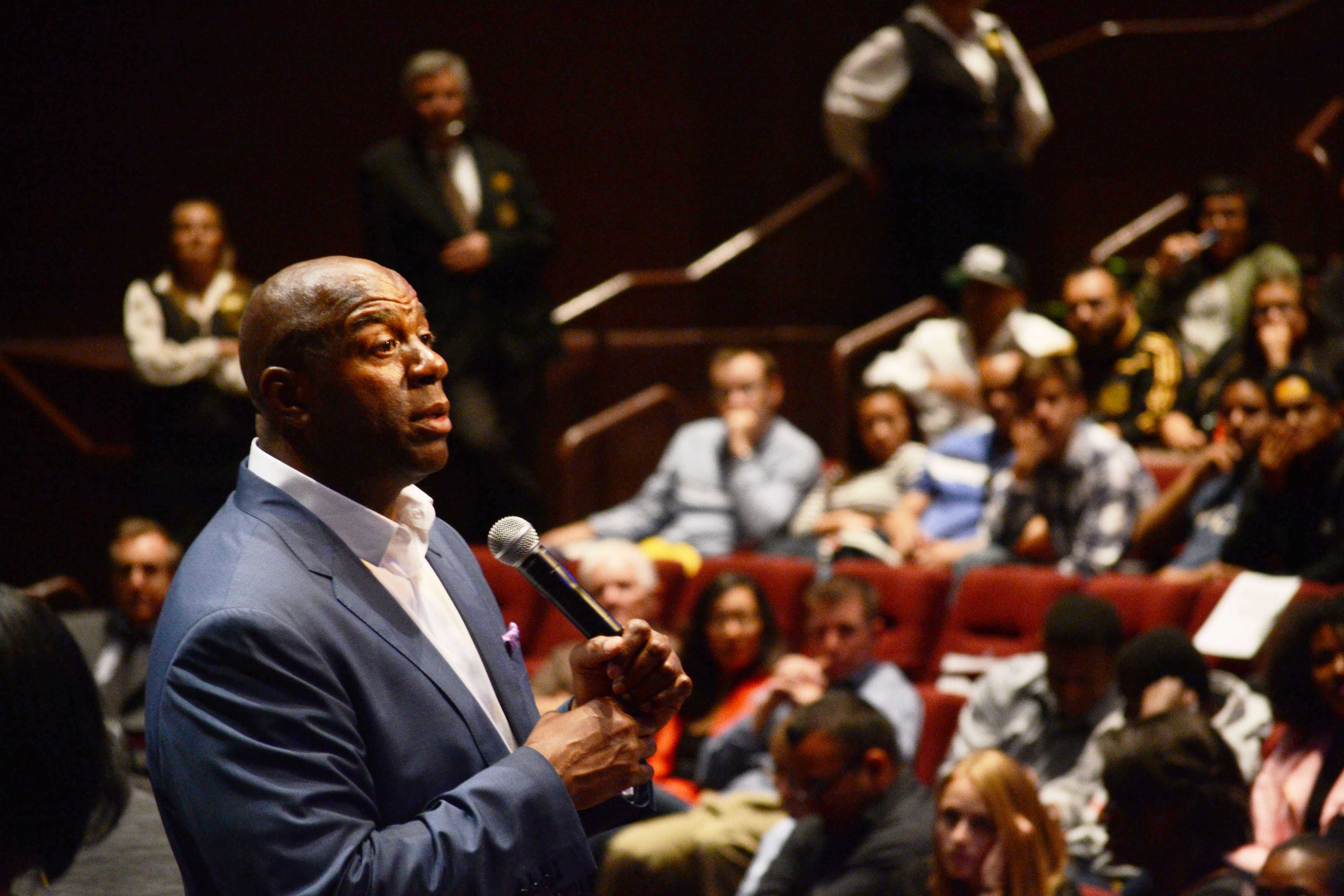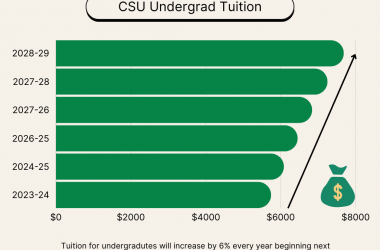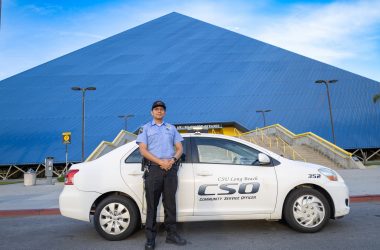Before former Laker Earvin “Magic” Johnson opened his first movie theater in Southern California in the mid-1990s, he sat down for breakfast with members from the Bloods and Crips street gangs and gave them an ultimatum.
In exchange for not bringing gang violence into his theater or wearing their gang colors of red and blue, Johnson agreed to employ 20 members of the Bloods and Crips to construct the new theater. After it was complete, Johnson kept 14 of the men on his payroll permanently.
Johnson, who spoke to hundreds of students, faculty and staff in the Carpenter Performing Arts Center Monday, discussed dozens of key moments that shaped the course of his life.
Before he started speaking to the roaring crowd, Johnson allowed audience members to take pictures of him with their cameras and smart phones. Johnson also posed for a few selfies with students sitting in the front row.
“I grew up poor but I didn’t have poor dreams,” Johnson said. “Just because we grow up poor, doesn’t mean we have to dream poor. If you don’t dream it, you can’t become it.”
Johnson, who was born in Lansing, Mich., spoke about his upbringing and his constant desire to be the best in the classroom and on the basketball court.
“Over and over again, I put the time in to be the best,” Johnson said. “You got to be the best at what you do.”
Once Johnson went to Everett High School, he said he matured into a leader when he tried to bridge the gap between white and black students. Johnson was given the nickname, “Magic,” by a sportswriter when he was 14 years old after having seen Johnson play well at a high school game.
Although Johnson spoke about a variety of different topics and interests, he continually referred to his drive to be successful as one of the main motivating factors in his life.
“I love challenges,” Johnson said. “That’s what I thrive on.”
After winning the NCAA men’s basketball championship in 1979 while attending Michigan State, Johnson said he transferred his hardworking attitude to the NBA team that drafted him — the Los Angeles Lakers.
“Losing becomes contagious,” he said. “I wanted everybody to understand that … I wanted to win the championship.”
Johnson said one of his favorite moments in life came when he showed up to basketball practice three hours early on his first day. After three days of showing up three hours early to practice, Johnson said his team’s coaches and players decided to follow his lead and change the practice time to 7 a.m.
While playing for the Lakers, Johnson won five NBA championships. He also won three Most Valuable Player awards in 1987, 1989 and 1990. He attributed his basketball success to his determination and willingness to win at all costs.
“It’s all about your mindset and attitude,” Johnson said. “You’re looking at a guy who grew up poor. Failure is not an option.”
Johnson’s career with the Lakers came to an abrupt halt in 1991 when he revealed that he had tested positive for HIV.
After his basketball career ended, Johnson transferred his on-the-court success to the business world. At different times in his career, Johnson had invested in Starbucks, TGI Fridays and most recently, the Los Angeles Dodgers.
Since Johnson bought the Dodgers as part of Guggenheim Baseball Management, he said the team has the highest attendance of any MLB team every year.
After speaking, Johnson took part in a Q&A session with student questions. He discussed spending time with former Lakers owner Jerry Buss before he died, playing against former Boston Celtics basketball player Larry Bird and overcoming his HIV diagnosis.
Senior American studies major Gerard Boltron said he enjoyed seeing Johnson speak to students.
“It was great to have a personal take,” Boltron said. “His drive is really inspirational.”
After answering questions ranging from, who is the best NBA player to whether he is interested in purchasing the Los Angeles Clippers from Donald Sterling, Johnson spoke candidly about what he thinks he will be remembered for.
“My legacy won’t be basketball,” he said. “It’s the 50,000 minorities I put to work everyday.”




